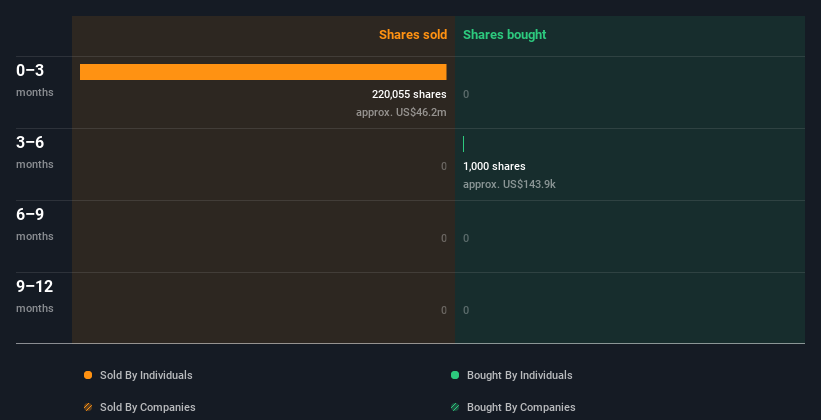American Express Insiders Sell US$46m Of Stock, Possibly Signalling Caution
The fact that multiple American Express Company (NYSE:AXP) insiders offloaded a considerable amount of shares over the past year could have raised some eyebrows amongst investors. When evaluating insider transactions, knowing whether insiders are buying versus if they selling is usually more beneficial, as the latter can be open to many interpretations. However, shareholders should take a deeper look if several insiders are selling stock over a specific time period.
Although we don't think shareholders should simply follow insider transactions, we do think it is perfectly logical to keep tabs on what insiders are doing.
View our latest analysis for American Express
The Last 12 Months Of Insider Transactions At American Express
In the last twelve months, the biggest single sale by an insider was when the Chairman & CEO, Stephen Squeri, sold US$15m worth of shares at a price of US$214 per share. So it's clear an insider wanted to take some cash off the table, even below the current price of US$222. When an insider sells below the current price, it suggests that they considered that lower price to be fair. That makes us wonder what they think of the (higher) recent valuation. However, while insider selling is sometimes discouraging, it's only a weak signal. It is worth noting that this sale was only 23% of Stephen Squeri's holding.
In total, American Express insiders sold more than they bought over the last year. The chart below shows insider transactions (by companies and individuals) over the last year. If you want to know exactly who sold, for how much, and when, simply click on the graph below!
I will like American Express better if I see some big insider buys. While we wait, check out this free list of growing companies with considerable, recent, insider buying.
Insiders At American Express Have Sold Stock Recently
The last three months saw significant insider selling at American Express. In total, insiders sold US$46m worth of shares in that time, and we didn't record any purchases whatsoever. In light of this it's hard to argue that all the insiders think that the shares are a bargain.
Insider Ownership Of American Express
Looking at the total insider shareholdings in a company can help to inform your view of whether they are well aligned with common shareholders. I reckon it's a good sign if insiders own a significant number of shares in the company. American Express insiders own 0.1% of the company, currently worth about US$211m based on the recent share price. I like to see this level of insider ownership, because it increases the chances that management are thinking about the best interests of shareholders.
What Might The Insider Transactions At American Express Tell Us?
Insiders sold American Express shares recently, but they didn't buy any. Zooming out, the longer term picture doesn't give us much comfort. But since American Express is profitable and growing, we're not too worried by this. While insiders do own a lot of shares in the company (which is good), our analysis of their transactions doesn't make us feel confident about the company. In addition to knowing about insider transactions going on, it's beneficial to identify the risks facing American Express. Case in point: We've spotted 2 warning signs for American Express you should be aware of.
But note: American Express may not be the best stock to buy. So take a peek at this free list of interesting companies with high ROE and low debt.
For the purposes of this article, insiders are those individuals who report their transactions to the relevant regulatory body. We currently account for open market transactions and private dispositions of direct interests only, but not derivative transactions or indirect interests.
Have feedback on this article? Concerned about the content? Get in touch with us directly. Alternatively, email editorial-team (at) simplywallst.com.
This article by Simply Wall St is general in nature. We provide commentary based on historical data and analyst forecasts only using an unbiased methodology and our articles are not intended to be financial advice. It does not constitute a recommendation to buy or sell any stock, and does not take account of your objectives, or your financial situation. We aim to bring you long-term focused analysis driven by fundamental data. Note that our analysis may not factor in the latest price-sensitive company announcements or qualitative material. Simply Wall St has no position in any stocks mentioned.

